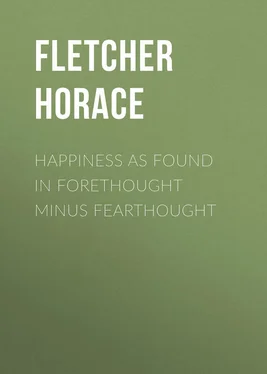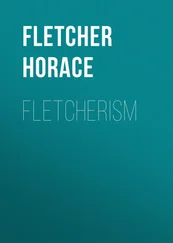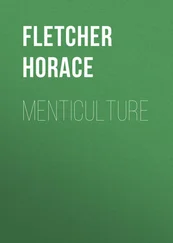Horace Fletcher - Happiness as Found in Forethought Minus Fearthought
Здесь есть возможность читать онлайн «Horace Fletcher - Happiness as Found in Forethought Minus Fearthought» — ознакомительный отрывок электронной книги совершенно бесплатно, а после прочтения отрывка купить полную версию. В некоторых случаях можно слушать аудио, скачать через торрент в формате fb2 и присутствует краткое содержание. Жанр: foreign_antique, foreign_prose, на английском языке. Описание произведения, (предисловие) а так же отзывы посетителей доступны на портале библиотеки ЛибКат.
- Название:Happiness as Found in Forethought Minus Fearthought
- Автор:
- Жанр:
- Год:неизвестен
- ISBN:нет данных
- Рейтинг книги:3 / 5. Голосов: 1
-
Избранное:Добавить в избранное
- Отзывы:
-
Ваша оценка:
- 60
- 1
- 2
- 3
- 4
- 5
Happiness as Found in Forethought Minus Fearthought: краткое содержание, описание и аннотация
Предлагаем к чтению аннотацию, описание, краткое содержание или предисловие (зависит от того, что написал сам автор книги «Happiness as Found in Forethought Minus Fearthought»). Если вы не нашли необходимую информацию о книге — напишите в комментариях, мы постараемся отыскать её.
Happiness as Found in Forethought Minus Fearthought — читать онлайн ознакомительный отрывок
Ниже представлен текст книги, разбитый по страницам. Система сохранения места последней прочитанной страницы, позволяет с удобством читать онлайн бесплатно книгу «Happiness as Found in Forethought Minus Fearthought», без необходимости каждый раз заново искать на чём Вы остановились. Поставьте закладку, и сможете в любой момент перейти на страницу, на которой закончили чтение.
Интервал:
Закладка:
Notwithstanding the words of Jesus of Nazareth, by which one-half of the world's inhabitants are supposed to be governed; notwithstanding the admonitions of the other great teachers to whom the other half of humanity turn for counsel; notwithstanding the lessons taught by all of nature's processes of growth, especially the teachings of later evolution; fear – fear of death, fear of disaster, fear of non-attainment, fear of non-preferment, and fear of the things that never happen as feared, and the anger and the worry growing out of these fears – have been looked upon as afflictions necessary to humanity, repressible only during life, and eradicable only at the change called death.
Early theology wrestled with conditions wherein it was thought necessary to use the whip of fear as well as the attraction of love to incline men to religion. Modern theology teaches the religion of love alone, but it has not yet sufficiently denounced the former teaching of fears, perhaps in the interest of consistency or because of filial respect, inasmuch as its parents once put the label of truth upon the religion of fear. Science also has taught, and still continues to teach, the potency of the crowding-out stimulant in growth, without proclaiming a line where attraction became the stronger motive in civilization – an intangible line already far astern in the wake of present progress.
Fear has had its uses in the evolutionary process, and seems to constitute the whole of forethought, as instinct seems to constitute the whole of intelligence in most animals, but that it should remain any part of the mental equipment of human civilized life is an absurdity. There are, undoubtedly, human beings that are still so nearly animal that fear alone will restrain them from wrong-doing, or stimulate them (or, rather, push them) to peaceful and useful living, but none such will read this book, and neither you nor I should be burdened by their limitations or necessities. We have passed the point where we need to be pushed ; or, if we have not, we are ashamed to confess it, thereby acknowledging that it is unnecessary; and are within the atmosphere of appreciation and attraction where fear and its expressions have no proper place, and where the toleration of fear beclouds not only our own clear vision, but also the vision of those who are still below us in the scale of intelligence, to whom, as beacon-lighters on the heights above them, we owe the influence of right example.
I have made especial study of the reports of the Society for Psychical Research, the book entitled "Fear," by Prof. Angelo Mosso, of Turin, Italy, and the contributions to the American Journal of Psychology by President G. Stanley Hall, of Clarke University, Worcester, Massachusetts; Dr. Colin A. Scott, Professor of Psychology and Child Study at Cook County Normal School, Chicago, Illinois; and others who are devoting particular attention to the causes and effects of fears in children; together with the after-effect of early fears upon persons when they are fully grown. The claim of these students is that the consideration of the future that constitutes forethought is a mixture of hope, faith and fear, the sum of which is the stimulant to action and progress, hope and faith being the civilized or divine motives, and fear being the animal motive. My own experience and observations corroborate this contention, but I find that the fear element of forethought is not stimulating to the more civilized persons, to whom duty and attraction are the natural motives of stimulation, but is weakening and deterrent. As soon as it becomes unnecessary, fear becomes a positive deterrent, and should be entirely removed, as dead flesh is removed from living tissue. I have also demonstrated, beyond the possibility of doubt, that the fear element can be eliminated out of forethought as soon as it becomes evident that it is unnecessary, separable and eliminable , and that energy and desire for progress and growth are beautifully stimulated as the result of its elimination .
To assist in the analysis of fear, and in the denunciation of its expressions, I have coined the word " fearthought " to stand for the unprofitable element of forethought, and have defined that variously-interpreted word "worry" as fearthought, in contradistinction to forethought . I have also defined "fearthought" as the self-imposed or self-permitted suggestion of inferiority , in order to place it where it really belongs, in the category of harmful, unnecessary, and, therefore, not-respectable things.
Darwin and Spencer and other biologists have asserted that if primitive man had not been urged by fear of discomfort he would have sat upon a stone, naked, near the roots or the herbs that served to appease his hunger – if it also happened to be near to a spring where he could quench his thirst – until he died; and that fear has been the impelling motive in the progress of the race. This was undoubtedly true up to a certain point, but, like many of the laws of ye olden tyme , is not applicable to the present nor to us.
There is now sufficient protection vouchsafed by forethought, and sufficient attraction furnished by affection and duty, to lead the van in the pursuit of progress, and to set an example that will be its own torch-bearer in guiding the trend of thought and of action.
When the motto, "Fearlessness," becomes embroidered upon the banners of all of our religious and other fraternal organizations; when "Freedom from Fear" becomes the slogan of Reform, and when Appreciation, Love and Altruism are admitted to the councils of men, then, and only then, will famine end, selfishness fade, strikes become unnecessary, misery depart, and Happiness become enthroned as the ruler of a joyously industrious and universally prosperous people.
Increase is prodigal, and accumulation is already prodigious, so that it is no longer a question of physical means, but a question of wise distribution and adjustment, to accomplish all that society requires to insure it unremitting happiness.
Churches there are, clubs there are, lodges there are, guilds there are, and many other fraternal organizations whose aims are practically the same, but whose members are attracted together into separate groups by sympathies of traditions, race, occupations or general trend-of-thought. It would be a useless iconoclasm to separate from these or to attempt to dismember them. They are all good organizations, wherein they conserve the principles of brotherhood and promote practical altruism; and are only imperfect wherein they tolerate slavery to the fears, slavery to wealth, slavery to the harmful conventions, and slavery to the antagonisms, intolerances and other evil passions that prevent economic co-operation, harmony and happiness.
The contention of this book is that, with means already secured, there is a way to individual happiness, even under existing conditions ; and also, that the present acceleration of progress, and certain already accomplished tests of possible industrial and economic reform, coupled with an optimism that has for its motto, "All can be , and, therefore, shall be well," not only promise, but assure, to mankind, in a not remote future, equal opportunities for securing happiness by means altogether honest and altruistic.
To all who will follow me through this volume, I promise to show ways and signs that will assist the weak to become strong, the poor to become rich in appreciation of their opportunities, and the rich to better enjoy their good fortune without impoverishing others to do so. My special desire is to enlist general aid in eradicating deterrents to growth, and in the acceleration of progress.
Читать дальшеИнтервал:
Закладка:
Похожие книги на «Happiness as Found in Forethought Minus Fearthought»
Представляем Вашему вниманию похожие книги на «Happiness as Found in Forethought Minus Fearthought» списком для выбора. Мы отобрали схожую по названию и смыслу литературу в надежде предоставить читателям больше вариантов отыскать новые, интересные, ещё непрочитанные произведения.
Обсуждение, отзывы о книге «Happiness as Found in Forethought Minus Fearthought» и просто собственные мнения читателей. Оставьте ваши комментарии, напишите, что Вы думаете о произведении, его смысле или главных героях. Укажите что конкретно понравилось, а что нет, и почему Вы так считаете.












